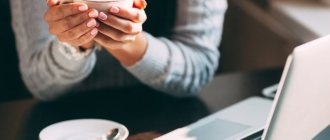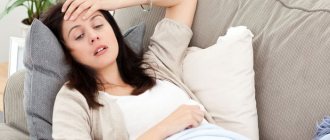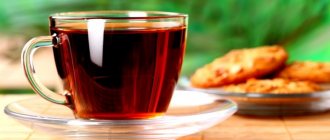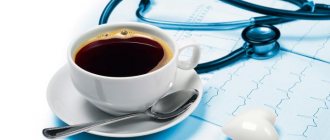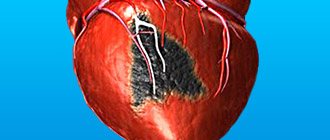Sometimes after a cup of coffee you feel sick. The concept of “bad” is different for everyone - you may feel weak, something similar to panic attacks, abdominal pain or indigestion, tachycardia, dizziness, etc. This can happen to people with chronic diseases as well as to those who appear to be healthy. Some people know about this peculiarity, while others suddenly feel ill after drinking coffee. In any case, you need to know what symptoms may be associated with the problem and what to do about them.
Exacerbation of diseases after drinking
Few people think about what consequences can occur after drinking a cup of coffee. The body cannot always cope with the next dose of caffeine that enters the body through drinking your favorite drink. It’s not just an overdose that can make a person feel bad.
With a weakened body in different situations or with exacerbation of chronic diseases, even a small portion can harm a person. Caffeine negatively affects the heart, brain, blood vessels, stomach and intestines.
You may feel ill after drinking coffee in the following cases:
- blood pressure is higher than normal;
- diseases of the cardiovascular system;
- vegetative-vascular dystonia;
- diseases of the stomach and intestines in the acute stage;
- arrhythmia and tachycardia;
- stressful condition.
In what situations can you feel sick after drinking coffee?
Most often, things get worse from an overdose of coffee. At the same time, it is not at all necessary that you really drank a lot of it, especially since “a lot” is a relative concept, and we can only talk about the amount of caffeine that the body cannot handle at the moment. Here is just an approximate list of diseases and situations in which even one cup of coffee can make you feel bad:
- Vegetative-vascular dystonia;
- Chronic cardiovascular diseases;
- Tachycardia and arrhythmia;
- High blood pressure;
- Diseases of the gastrointestinal tract;
- Stress;
- State of lack of sleep;
- Illness or weakness of the body.
Most often, things get worse if you drink coffee on an empty stomach, especially if your body is weakened.
Negative effects on the human body
Daily uncontrolled consumption of the drink causes the development of serious diseases. The heart is most exposed to this attack. This leads to the development of heart disease. Caffeine affects the adrenal glands, which produce adrenaline. There is a load on the heart, it pumps blood faster, but at the same time the blood vessels are narrowed. As a result, the pulse quickens and tachycardia occurs. Side effects from coffee cause a person to feel ill.
Abuse of the drink causes irritation of the stomach and bladder. A person feels nauseous, there is a sharp pain and heaviness in the abdomen. Diarrhea may occur. Excessive consumption affects the digestive system. After an overdose, prolonged depression or sudden excitation of the nervous system sometimes occurs. Headaches can also be caused by excess caffeine in the body. It can be bad from drinking a cup of coffee on an empty stomach.
What to do if you overdose on caffeine: tips from a barista
I really love coffee. I like its taste and smell. I love trying different coffee blends and hearing about coffee from people who are passionate about it and their work. But with all my love for this drink and having a coffee machine at home, I try to control myself and limit myself to a few cups of coffee a day (1 espresso and 1 cappuccino or latte). If I couldn’t resist and I dropped by my favorite Coffee House to see my friends, where it’s always cozy, warm and smells delicious, the result doesn’t take long to arrive. Rapid heartbeat, trembling hands, wet palms - all these are not very pleasant consequences of a caffeine overdose.
But sometimes drinking large quantities of coffee is necessary (for example, during a long flight). How to get rid of these unpleasant consequences? The answer to this question is well known to those for whom coffee is work and life. Baristas share their ways to combat the unpleasant effects of a coffee overdose.
I usually eat bananas and drink a ton of water. If the condition is very severe, similar to a hangover, I eat potatoes and a burger. And, of course, sleep! Alexandra Liltjohn, Verve Coffee Roasters
Eating a large meal and walking the dog outside helps quite a lot. Michael Harwood, Carrboro Coffee Roasters
Croissant and a cup of water! Amanda Witt, Everyman Espresso
After drinking a few cups of coffee, you need to replenish your fluid reserves by drinking plenty of water. Tony Riefel, Octane Coffee
Bananas! Folks, science has already proven that bananas help stop nervous tremors in your hands and remove ripples in your eyes after too much espresso. We always bring a bunch of bananas to our Advanced Espresso class and I recommend this for every cuptasting class. Eat bananas! Simon Ouderkirk, Spot Coffee
Usually I just need a good night's sleep, like after a wild party. Charrow, Joe
When I feel like I'm overdoing it on caffeine, it's time for water, vitamin B, and a banana. Maybe for a bike ride too. The second coffee roaster I worked for always kept fresh bee pollen in the cuptasting room. This also helped. Trevor Greun, Johnson Public
Water. Much water. Dehydration is bad. Leila Gambari, Caffe Ladro
I have known for a long time that one cup of espresso is equal to 1 cup of water. That is, when drinking one cup of coffee, you need to drink 1 glass of water to restore water balance. I think that a glass of water served with a cup of espresso or Turkish coffee is not only for the sake of refreshing your taste buds and tasting all the nuances of taste again and again.
But this is the first time I’ve read about bananas. Bananas contain a large amount of potassium, and coffee flushes it out of the body. In addition to banana, there are other foods that contain potassium (like milk or cheese), but banana not only helps restore potassium reserves, but is also a cheap and high-calorie option for a quick and easy snack, as it contains a large amount of sugar .
I tried to find scientific sources that said that bananas actually help cope with caffeine overdose due to their high potassium and sugar content. But I never found anything. Therefore, for now we can trust the barista and try, in case of excessive coffee consumption (abuse), eat at least one banana and see if it really helps. This will definitely not make anyone worse.
How to help yourself?
If you feel unwell every time you drink the drink, you should either give it up or reconsider the daily dose. If you feel unwell for a short time, do not panic. Correctly taken measures will help you quickly get rid of the ailment. If you know for sure that you feel sick from coffee, you need to neutralize caffeine in your body as quickly as possible. Eating a banana, drinking water or milk will help you return to normal.
To process caffeine faster in case of increased excitability, heat, heart pain, rapid pulse, it is recommended to perform light physical exercise. For dizziness, headaches and weakness, it is necessary to stabilize the access of oxygen to the brain. In this condition, it is better to lie down and try to raise your legs above your head. Anyone who drinks more than the norm of instant drink is more likely to experience weakness, nausea, and severe stomach pain. Powder and coffee granules contain up to 80% additives (preservatives, dyes, stabilizers, etc.). This chemical composition has a negative effect on the human body, so it is better to choose natural beans.
For various reasons, coffee can make you feel bad. If you cook it at home from natural grains, you can make a mistake in the proportions. In this case, coffee lovers are more susceptible to negative influences than those who drink drinks in a coffee shop. Thanks to the standard recipe and compliance with all proportions, the drink brewed in a coffee machine contains approximately the same percentage of caffeine in each cup. Knowing your norm, you can protect your body from overdose.
In order not to feel bad after coffee prepared at home, you must adhere to the following rules:
- grind coffee beans immediately before preparation;
- observe the standard number of grams for each cup;
- Always cook using the same technology.
You can feel bad from exceeding the dose of caffeine that your body is accustomed to. The concentration of this substance in the drink increases if you cook it slowly and then let it sit with the grounds in a pot. The caffeine percentage will be lower if you brew faster and filter the grounds.
No more than 300 mg of caffeine daily is not dangerous for an adult. But it is difficult to independently calculate the amount of this substance in each cup. This composition is contained in three cups of natural coffee. If there is even the slightest contraindication to drinking the drink, you should not risk your health and it is better to refuse it.
What to do if you feel sick from coffee?
If every time you drink coffee you feel bad, you should either seriously reduce the dose, or try decaffeinated coffee, or maybe even give it up altogether. But usually it happens bad once, almost by accident, and in this case there is no need to panic: usually everything goes away in about 15-20 minutes. If you feel nauseous, you can try to get rid of the drink you drank; if not, there are ways to help your body return to normal faster:
- If you feel weakness, dizziness, tachycardia, pain in the head, it is advisable to sit down or lie down, ensure an influx of oxygen, perhaps raise your legs above your head so that oxygen flows to the brain. If it's freezing, you can wrap yourself up.
- If there is pain in the heart, increased excitability, pain in the temples, rapid pulse, fever, provide access to air and try to do a few physical exercises, just to speed up the metabolism and the caffeine is processed faster.
In any case, it is good to drink water, you can eat a banana, drink milk. Lemon water may help. Possibly sedatives for the heart and blood vessels.
What should you not combine coffee with?
It is not advisable to drink coffee during treatment. When taking medications, you should be aware that interactions with chemical compounds contained in medications can lead to dire consequences and cause deterioration in well-being. Therefore, it is not surprising if the patient feels unwell while taking pills and washing them down with coffee.
To avoid serious consequences for the body, you should not drink alcoholic and invigorating drinks at the same time. This combination leads to severe dehydration of the body, making it impossible to tone up and quickly recover from an alcohol attack.
An equally dangerous combination of an invigorating drink and nicotine. Heavy smokers do not even suspect how detrimental this combination affects the functioning of vital human organs. With this combination, the cardiovascular and nervous systems are most affected, and the gastrointestinal tract suffers. The simultaneous use of coffee and cigarettes puts a serious strain on the heart and can cause a heart attack, which has serious consequences. Nicotine, in combination with caffeine, has a destructive effect on the nervous system. Cells are simultaneously affected by two psychotropic substances. This is why smokers and coffee drinkers combined are more susceptible to nervous breakdowns, mental disorders and depression.
To prevent addiction to coffee from leading to depletion of the body or causing a number of serious diseases, before drinking an extra portion, think about whether it will harm your health. An invigorating drink should be enjoyed and it is better to drink a cup made from natural grains than from instant powder. Coffee contains many beneficial substances that will have a positive effect on the body. It can prevent some diseases (cancer, diabetes, Parkinson's disease, etc.). If there are contraindications or a person notices that he feels bad after drinking it, it is recommended to give it up altogether or replace it with other drinks.
What to do if your condition worsens after an IV drip
The very first thing to do is to notify the doctor who was involved in breaking the binge about what is happening. As a rule, the drug treatment team remains with the patient until the vital signs (heart rate, blood pressure, absence of breathing difficulties, etc.) are finally stabilized, but it happens that the patient gets worse later, when the doctor has already left - provided that Of course, the binge was interrupted at home, and not in the hospital.
It is not recommended to give the patient any medications without consulting a doctor, since symptomatic therapy may not always be useful. For example, with initial hypoglycemia, an alcohol-dependent patient may feel the same fever and headache as during intoxication, but taking aspirin or citramon in this case will help very little, since the root cause of these symptoms is a decrease in the concentration of glucose in the blood, and a simple piece of sugar will help him more than a package of antipyretics or analgesics.
It is very important to understand: deterioration of the condition after a drip from binge drinking in most cases occurs due to developing complications. This means that those measures that are usually taken to interrupt binge drinking (provoking vomiting, taking sorbents, etc.) cannot be used in this case, since the patient has already been taken out of the binge state, and now he suffers from the consequences of his drunkenness or from the side effects of the drugs administered to him. drugs. There is no way to do this without qualified medical care, and any attempts to play around with self-medication can only be successful by a very happy accident.

